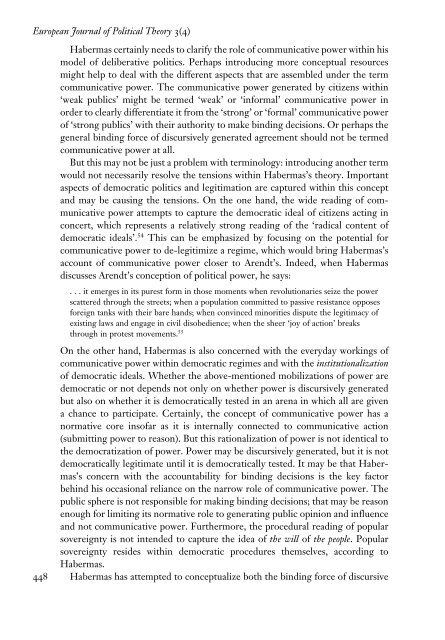Communicative Power in Habermas's Theory of Democracy
Communicative Power in Habermas's Theory of Democracy
Communicative Power in Habermas's Theory of Democracy
Create successful ePaper yourself
Turn your PDF publications into a flip-book with our unique Google optimized e-Paper software.
European Journal <strong>of</strong> Political <strong>Theory</strong> 3(4)448Habermas certa<strong>in</strong>ly needs to clarify the role <strong>of</strong> communicative power with<strong>in</strong> hismodel <strong>of</strong> deliberative politics. Perhaps <strong>in</strong>troduc<strong>in</strong>g more conceptual resourcesmight help to deal with the different aspects that are assembled under the termcommunicative power. The communicative power generated by citizens with<strong>in</strong>‘weak publics’ might be termed ‘weak’ or ‘<strong>in</strong>formal’ communicative power <strong>in</strong>order to clearly differentiate it from the ‘strong’ or ‘formal’ communicative power<strong>of</strong> ‘strong publics’ with their authority to make b<strong>in</strong>d<strong>in</strong>g decisions. Or perhaps thegeneral b<strong>in</strong>d<strong>in</strong>g force <strong>of</strong> discursively generated agreement should not be termedcommunicative power at all.But this may not be just a problem with term<strong>in</strong>ology: <strong>in</strong>troduc<strong>in</strong>g another termwould not necessarily resolve the tensions with<strong>in</strong> Habermas’s theory. Importantaspects <strong>of</strong> democratic politics and legitimation are captured with<strong>in</strong> this conceptand may be caus<strong>in</strong>g the tensions. On the one hand, the wide read<strong>in</strong>g <strong>of</strong> communicativepower attempts to capture the democratic ideal <strong>of</strong> citizens act<strong>in</strong>g <strong>in</strong>concert, which represents a relatively strong read<strong>in</strong>g <strong>of</strong> the ‘radical content <strong>of</strong>democratic ideals’. 54 This can be emphasized by focus<strong>in</strong>g on the potential forcommunicative power to de-legitimize a regime, which would br<strong>in</strong>g Habermas’saccount <strong>of</strong> communicative power closer to Arendt’s. Indeed, when Habermasdiscusses Arendt’s conception <strong>of</strong> political power, he says:. . . it emerges <strong>in</strong> its purest form <strong>in</strong> those moments when revolutionaries seize the powerscattered through the streets; when a population committed to passive resistance opposesforeign tanks with their bare hands; when conv<strong>in</strong>ced m<strong>in</strong>orities dispute the legitimacy <strong>of</strong>exist<strong>in</strong>g laws and engage <strong>in</strong> civil disobedience; when the sheer ‘joy <strong>of</strong> action’ breaksthrough <strong>in</strong> protest movements. 55On the other hand, Habermas is also concerned with the everyday work<strong>in</strong>gs <strong>of</strong>communicative power with<strong>in</strong> democratic regimes and with the <strong>in</strong>stitutionalization<strong>of</strong> democratic ideals. Whether the above-mentioned mobilizations <strong>of</strong> power aredemocratic or not depends not only on whether power is discursively generatedbut also on whether it is democratically tested <strong>in</strong> an arena <strong>in</strong> which all are givena chance to participate. Certa<strong>in</strong>ly, the concept <strong>of</strong> communicative power has anormative core <strong>in</strong>s<strong>of</strong>ar as it is <strong>in</strong>ternally connected to communicative action(submitt<strong>in</strong>g power to reason). But this rationalization <strong>of</strong> power is not identical tothe democratization <strong>of</strong> power. <strong>Power</strong> may be discursively generated, but it is notdemocratically legitimate until it is democratically tested. It may be that Habermas’sconcern with the accountability for b<strong>in</strong>d<strong>in</strong>g decisions is the key factorbeh<strong>in</strong>d his occasional reliance on the narrow role <strong>of</strong> communicative power. Thepublic sphere is not responsible for mak<strong>in</strong>g b<strong>in</strong>d<strong>in</strong>g decisions; that may be reasonenough for limit<strong>in</strong>g its normative role to generat<strong>in</strong>g public op<strong>in</strong>ion and <strong>in</strong>fluenceand not communicative power. Furthermore, the procedural read<strong>in</strong>g <strong>of</strong> popularsovereignty is not <strong>in</strong>tended to capture the idea <strong>of</strong> the will <strong>of</strong> the people. Popularsovereignty resides with<strong>in</strong> democratic procedures themselves, accord<strong>in</strong>g toHabermas.Habermas has attempted to conceptualize both the b<strong>in</strong>d<strong>in</strong>g force <strong>of</strong> discursive
















